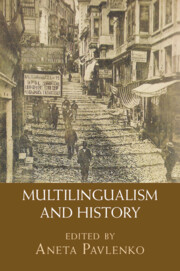Book contents
- Multilingualism and History
- Multilingualism and History
- Copyright page
- Contents
- Figures
- Contributors
- Acknowledgments
- 1 Multilingualism and Historical Amnesia: An Introduction
- 2 Greek Meets Egyptian at the Temple Gate: Bilingual Papyri from Hellenistic and Roman Egypt (Third Century BCE–Fourth Century CE)
- 3 Language Shift, Attitudes and Management in the Roman West
- 4 Languages at War: Military Interpreters in Antiquity and the Modern World
- 5 How Multilingualism Came to Be Ignored in the History of Standard English
- 6 Multilingualism and the Attitude toward French in the Latin Kingdom of Jerusalem
- 7 Why Colonial Dutch Failed to Become a Global Lingua Franca
- 8 How Unique Was Russia’s Multilingual Elite?
- 9 Language Ideology and Observation: Nineteenth-Century Scholars in Northwestern Siberia
- 10 Studying Historical Multilingualism in Everyday Life: The Case of the Habsburg Monarchy in the Nineteenth Century
- 11 Multilingualism and the End of the Ottoman Empire: Language, Script, and the Quest for the ‘Modern’
- 12 “Multilingualism Is Now a Must”: Discourses on Languages and International Cooperation at the Council of Europe
- 13 The Role of the Past in Language Revitalization
- 14 Historic Reenactments in Contemporary Spain: Fiestas de moros y cristianos
- 15 Multilingual Ghost Signs: Dissonant Languages in the Landscape of Memory
- Index
- References
3 - Language Shift, Attitudes and Management in the Roman West
Published online by Cambridge University Press: 20 April 2023
- Multilingualism and History
- Multilingualism and History
- Copyright page
- Contents
- Figures
- Contributors
- Acknowledgments
- 1 Multilingualism and Historical Amnesia: An Introduction
- 2 Greek Meets Egyptian at the Temple Gate: Bilingual Papyri from Hellenistic and Roman Egypt (Third Century BCE–Fourth Century CE)
- 3 Language Shift, Attitudes and Management in the Roman West
- 4 Languages at War: Military Interpreters in Antiquity and the Modern World
- 5 How Multilingualism Came to Be Ignored in the History of Standard English
- 6 Multilingualism and the Attitude toward French in the Latin Kingdom of Jerusalem
- 7 Why Colonial Dutch Failed to Become a Global Lingua Franca
- 8 How Unique Was Russia’s Multilingual Elite?
- 9 Language Ideology and Observation: Nineteenth-Century Scholars in Northwestern Siberia
- 10 Studying Historical Multilingualism in Everyday Life: The Case of the Habsburg Monarchy in the Nineteenth Century
- 11 Multilingualism and the End of the Ottoman Empire: Language, Script, and the Quest for the ‘Modern’
- 12 “Multilingualism Is Now a Must”: Discourses on Languages and International Cooperation at the Council of Europe
- 13 The Role of the Past in Language Revitalization
- 14 Historic Reenactments in Contemporary Spain: Fiestas de moros y cristianos
- 15 Multilingual Ghost Signs: Dissonant Languages in the Landscape of Memory
- Index
- References
Summary
To explain Latinization of the Roman West, scholars have long searched for evidence of a language policy mandating the use of Latin. They have found none under the Principate. The Roman centre was not interested in policies involving all its subjects, and elite Romans were uninterested in languages other than Latin and Greek and had no concerns about their use, as long as the Empire’s functioning remained intact. Indeed, it is not clear that any such policy would have made much sense for provincials in illiterate and translingual environments. However, though there may not have been an Empire-wide policy of Latinization, there were certainly language ideologies and multiple narrowly focused facets of language management concerning the use of Latin and Greek in the running of the Empire.
Keywords
Information
- Type
- Chapter
- Information
- Multilingualism and History , pp. 71 - 89Publisher: Cambridge University PressPrint publication year: 2023
References
Accessibility standard: Unknown
Why this information is here
This section outlines the accessibility features of this content - including support for screen readers, full keyboard navigation and high-contrast display options. This may not be relevant for you.Accessibility Information
- 3
- Cited by
